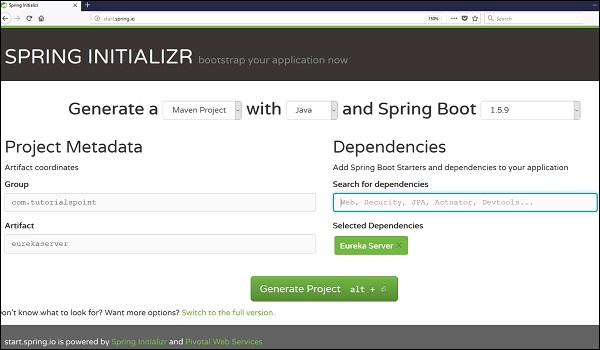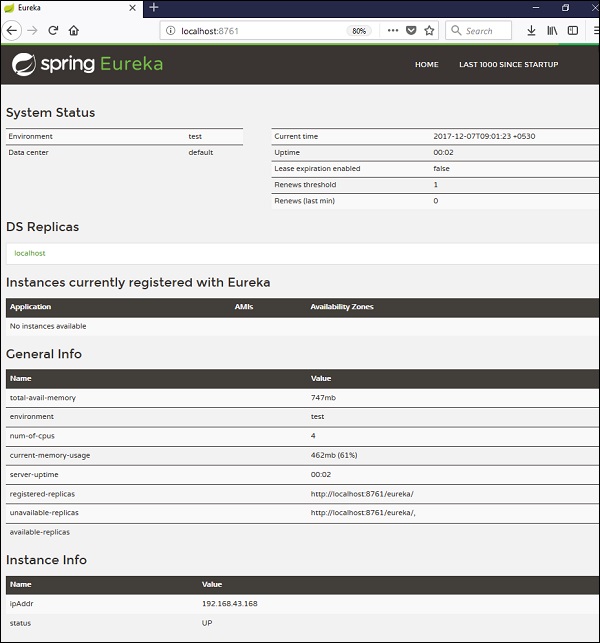
- Spring Boot - Home
- Spring Boot - Introduction
- Spring Boot - Quick Start using CLI
- Spring Boot - Bootstrapping
- Spring Tool Suite
- Spring Boot - Tomcat Deployment
- Spring Boot - Build Systems
- Spring Boot - Code Structure
- Spring Boot - Beans & Dependency Injection
- Spring Boot - Runners
- Spring Boot - Starters
- Spring Boot - Application Properties
- Spring Boot - Configuration
- Spring Boot - Annotations
- Spring Boot - Logging
- Building RESTful Web Services
- Spring Boot - Exception Handling
- Spring Boot - Interceptor
- Spring Boot - Servlet Filter
- Spring Boot - Tomcat Port Number
- Spring Boot - Rest Template
- Spring Boot - File Handling
- Spring Boot - Service Components
- Spring Boot - Thymeleaf
- Consuming RESTful Web Services
- Spring Boot - CORS Support
- Spring Boot - Internationalization
- Spring Boot - Scheduling
- Spring Boot - Enabling HTTPS
- Spring Boot - Eureka Server
- Service Registration with Eureka
- Gateway Proxy Server and Routing
- Spring Cloud Configuration Server
- Spring Cloud Configuration Client
- Spring Boot - Actuator
- Spring Boot - Admin Server
- Spring Boot - Admin Client
- Spring Boot - Enabling Swagger2
- Spring Boot - Using SpringDoc OpenAPI
- Spring Boot - Creating Docker Image
- Tracing Micro Service Logs
- Spring Boot - Flyway Database
- Spring Boot - Sending Email
- Spring Boot - Hystrix
- Spring Boot - Web Socket
- Spring Boot - Batch Service
- Spring Boot - Apache Kafka
- Spring Boot - Twilio
- Spring Boot - Unit Testing
- Rest Controller Unit Testing
- Spring Boot - Database Handling
- Securing Web Applications
- Spring Boot - OAuth2 with JWT
- Spring Boot - Google Cloud Platform
- Spring Boot - Google OAuth2 Sign-In
Spring Boot Resources
Spring Boot - Eureka Server
Eureka Server is an application that holds the information about all client-service applications. Every Micro service will register into the Eureka server and Eureka server knows all the client applications running on each port and IP address. Eureka Server is also known as Discovery Server.
In this chapter, we will learn in detail about How to build a Eureka server.
Example - Building a Eureka Server
Eureka Server comes with the bundle of Spring Cloud. For this, we need to develop the Eureka server and run it on the default port 8761.
Visit the Spring Initializer homepage https://start.spring.io/ and download the Spring Boot project with Eureka server dependency. It is shown in the screenshot below −

After downloading the project in main Spring Boot Application class file, we need to add @EnableEurekaServer annotation. The @EnableEurekaServer annotation is used to make your Spring Boot application acts as a Eureka Server.
The code for main Spring Boot application class file is as shown below −
EurekaserverApplication.java
package com.tutorialspoint.eurekaserver;
import org.springframework.boot.SpringApplication;
import org.springframework.boot.autoconfigure.SpringBootApplication;
import org.springframework.cloud.netflix.eureka.server.EnableEurekaServer;
@SpringBootApplication
@EnableEurekaServer
public class EurekaserverApplication {
public static void main(String[] args) {
SpringApplication.run(EurekaserverApplication.class, args);
}
}
Make sure Spring cloud Eureka server dependency is added in your build configuration file.
The code for Maven user dependency is shown below −
<dependency> <groupId>org.springframework.cloud</groupId> <artifactId>spring-cloud-starter-netflix-eureka-server</artifactId> </dependency>
The code for Gradle user dependency is given below −
compile('org.springframework.cloud:spring-cloud-starter-netflix-eureka-server')
The complete build configuration file is given below −
Maven - pom.xml
<?xml version="1.0" encoding="UTF-8"?>
<project xmlns="http://maven.apache.org/POM/4.0.0" xmlns:xsi="http://www.w3.org/2001/XMLSchema-instance"
xsi:schemaLocation="http://maven.apache.org/POM/4.0.0 https://maven.apache.org/xsd/maven-4.0.0.xsd">
<modelVersion>4.0.0</modelVersion>
<parent>
<groupId>org.springframework.boot</groupId>
<artifactId>spring-boot-starter-parent</artifactId>
<version>3.5.6</version>
<relativePath/> <!-- lookup parent from repository -->
</parent>
<groupId>com.tutorialspoint</groupId>
<artifactId>eurekaserver</artifactId>
<version>0.0.1-SNAPSHOT</version>
<name>eurekaserver</name>
<description>Demo project for Spring Boot</description>
<url/>
<licenses>
<license/>
</licenses>
<developers>
<developer/>
</developers>
<scm>
<connection/>
<developerConnection/>
<tag/>
<url/>
</scm>
<properties>
<java.version>21</java.version>
<spring-cloud.version>2025.0.0</spring-cloud.version>
</properties>
<dependencies>
<dependency>
<groupId>org.springframework.cloud</groupId>
<artifactId>spring-cloud-starter-netflix-eureka-server</artifactId>
</dependency>
<dependency>
<groupId>org.springframework.boot</groupId>
<artifactId>spring-boot-starter-test</artifactId>
<scope>test</scope>
</dependency>
</dependencies>
<dependencyManagement>
<dependencies>
<dependency>
<groupId>org.springframework.cloud</groupId>
<artifactId>spring-cloud-dependencies</artifactId>
<version>${spring-cloud.version}</version>
<type>pom</type>
<scope>import</scope>
</dependency>
</dependencies>
</dependencyManagement>
<build>
<plugins>
<plugin>
<groupId>org.springframework.boot</groupId>
<artifactId>spring-boot-maven-plugin</artifactId>
</plugin>
</plugins>
</build>
</project>
Gradle build.gradle
buildscript {
ext {
springBootVersion = '3.5.6'
}
repositories {
mavenCentral()
}
dependencies {
classpath("org.springframework.boot:spring-boot-gradle-plugin:${springBootVersion}")
}
}
apply plugin: 'java'
apply plugin: 'eclipse'
apply plugin: 'org.springframework.boot'
group = 'com.tutorialspoint'
version = '0.0.1-SNAPSHOT'
sourceCompatibility = 21
repositories {
mavenCentral()
}
ext {
springCloudVersion = '2025.0.0'
}
dependencies {
compile('org.springframework.cloud:spring-cloud-starter-netflix-eureka-server')
testCompile('org.springframework.boot:spring-boot-starter-test')
}
dependencyManagement {
imports {
mavenBom "org.springframework.cloud:spring-cloud-dependencies:${springCloudVersion}"
}
}
By default, the Eureka Server registers itself into the discovery. You should add the below given configuration into your application.properties file or application.yml file.
application.properties file is given below −
eureka.client.registerWithEureka = false eureka.client.fetchRegistry = false server.port = 8761
The application.yml file is given below −
eureka:
client:
registerWithEureka: false
fetchRegistry: false
server:
port: 8761
Output
Now, you can create an executable JAR file, and run the Spring Boot application by using the Maven or Gradle commands shown below −
For Maven, use the command as shown below −
mvn clean install
After "BUILD SUCCESS", you can find the JAR file under the target directory.
For Gradle, you can use the command shown below −
gradle clean build
After "BUILD SUCCESSFUL", you can find the JAR file under the build/libs directory.
Now, run the JAR file by using the following command −
java jar <JARFILE>
You can find that the application has started on the Tomcat port 8761 as shown below −
. ____ _ __ _ _ /\\ / ___'_ __ _ _(_)_ __ __ _ \ \ \ \ ( ( )\___ | '_ | '_| | '_ \/ _` | \ \ \ \ \\/ ___)| |_)| | | | | || (_| | ) ) ) ) ' |____| .__|_| |_|_| |_\__, | / / / / =========|_|==============|___/=/_/_/_/ :: Spring Boot :: (v3.5.6) 2025-09-29T12:45:26.399+05:30 INFO 41552 --- [eurekaserver] [ main] c.t.e.EurekaserverApplication : Starting EurekaserverApplication using Java 21.0.6 with PID 41552 (D:\Projects\eurekaserver\target\classes started by mahes in D:\Projects\eurekaserver) 2025-09-29T12:45:26.402+05:30 INFO 41552 --- [eurekaserver] [ main] c.t.e.EurekaserverApplication : No active profile set, falling back to 1 default profile: "default" 2025-09-29T12:45:27.714+05:30 INFO 41552 --- [eurekaserver] [ main] o.s.cloud.context.scope.GenericScope : BeanFactory id=37b0aecd-4feb-3fa0-b028-b62a23271b1d 2025-09-29T12:45:28.120+05:30 INFO 41552 --- [eurekaserver] [ main] o.s.b.w.embedded.tomcat.TomcatWebServer : Tomcat initialized with port 8761 (http) 2025-09-29T12:45:28.160+05:30 INFO 41552 --- [eurekaserver] [ main] o.apache.catalina.core.StandardService : Starting service [Tomcat] 2025-09-29T12:45:28.160+05:30 INFO 41552 --- [eurekaserver] [ main] o.apache.catalina.core.StandardEngine : Starting Servlet engine: [Apache Tomcat/10.1.46] 2025-09-29T12:45:28.243+05:30 INFO 41552 --- [eurekaserver] [ main] o.a.c.c.C.[Tomcat].[localhost].[/] : Initializing Spring embedded WebApplicationContext 2025-09-29T12:45:28.246+05:30 INFO 41552 --- [eurekaserver] [ main] w.s.c.ServletWebServerApplicationContext : Root WebApplicationContext: initialization completed in 1783 ms 2025-09-29T12:45:29.129+05:30 INFO 41552 --- [eurekaserver] [ main] c.n.d.provider.DiscoveryJerseyProvider : Using JSON encoding codec LegacyJacksonJson 2025-09-29T12:45:29.130+05:30 INFO 41552 --- [eurekaserver] [ main] c.n.d.provider.DiscoveryJerseyProvider : Using JSON decoding codec LegacyJacksonJson 2025-09-29T12:45:29.316+05:30 INFO 41552 --- [eurekaserver] [ main] c.n.d.provider.DiscoveryJerseyProvider : Using XML encoding codec XStreamXml 2025-09-29T12:45:29.317+05:30 INFO 41552 --- [eurekaserver] [ main] c.n.d.provider.DiscoveryJerseyProvider : Using XML decoding codec XStreamXml 2025-09-29T12:45:29.532+05:30 INFO 41552 --- [eurekaserver] [ main] o.s.v.b.OptionalValidatorFactoryBean : Failed to set up a Bean Validation provider: jakarta.validation.NoProviderFoundException: Unable to create a Configuration, because no Jakarta Bean Validation provider could be found. Add a provider like Hibernate Validator (RI) to your classpath. 2025-09-29T12:45:30.289+05:30 WARN 41552 --- [eurekaserver] [ main] iguration$LoadBalancerCaffeineWarnLogger : Spring Cloud LoadBalancer is currently working with the default cache. While this cache implementation is useful for development and tests, it's recommended to use Caffeine cache in production.You can switch to using Caffeine cache, by adding it and org.springframework.cache.caffeine.CaffeineCacheManager to the classpath. 2025-09-29T12:45:30.318+05:30 INFO 41552 --- [eurekaserver] [ main] o.s.c.n.eureka.InstanceInfoFactory : Setting initial instance status as: STARTING 2025-09-29T12:45:30.344+05:30 INFO 41552 --- [eurekaserver] [ main] com.netflix.discovery.DiscoveryClient : Initializing Eureka in region us-east-1 2025-09-29T12:45:30.345+05:30 INFO 41552 --- [eurekaserver] [ main] com.netflix.discovery.DiscoveryClient : Client configured to neither register nor query for data. 2025-09-29T12:45:30.348+05:30 INFO 41552 --- [eurekaserver] [ main] com.netflix.discovery.DiscoveryClient : Discovery Client initialized at timestamp 1759130130346 with initial instances count: 0 2025-09-29T12:45:30.401+05:30 INFO 41552 --- [eurekaserver] [ main] c.n.eureka.DefaultEurekaServerContext : Initializing ... 2025-09-29T12:45:30.403+05:30 INFO 41552 --- [eurekaserver] [ main] c.n.eureka.cluster.PeerEurekaNodes : Adding new peer nodes [http://localhost:8761/eureka/] 2025-09-29T12:45:30.524+05:30 INFO 41552 --- [eurekaserver] [ main] c.n.d.provider.DiscoveryJerseyProvider : Using JSON encoding codec LegacyJacksonJson 2025-09-29T12:45:30.524+05:30 INFO 41552 --- [eurekaserver] [ main] c.n.d.provider.DiscoveryJerseyProvider : Using JSON decoding codec LegacyJacksonJson 2025-09-29T12:45:30.524+05:30 INFO 41552 --- [eurekaserver] [ main] c.n.d.provider.DiscoveryJerseyProvider : Using XML encoding codec XStreamXml 2025-09-29T12:45:30.524+05:30 INFO 41552 --- [eurekaserver] [ main] c.n.d.provider.DiscoveryJerseyProvider : Using XML decoding codec XStreamXml 2025-09-29T12:45:30.579+05:30 INFO 41552 --- [eurekaserver] [ main] c.n.eureka.cluster.PeerEurekaNodes : Replica node URL: http://localhost:8761/eureka/ 2025-09-29T12:45:30.589+05:30 INFO 41552 --- [eurekaserver] [ main] c.n.e.registry.AbstractInstanceRegistry : Finished initializing remote region registries. All known remote regions: [] 2025-09-29T12:45:30.589+05:30 INFO 41552 --- [eurekaserver] [ main] c.n.eureka.DefaultEurekaServerContext : Initialized 2025-09-29T12:45:30.608+05:30 INFO 41552 --- [eurekaserver] [ main] o.s.b.a.e.web.EndpointLinksResolver : Exposing 1 endpoint beneath base path '/actuator' 2025-09-29T12:45:30.675+05:30 INFO 41552 --- [eurekaserver] [ main] o.s.c.n.e.s.EurekaServiceRegistry : Registering application EUREKASERVER with eureka with status UP 2025-09-29T12:45:30.688+05:30 INFO 41552 --- [eurekaserver] [ Thread-9] o.s.c.n.e.server.EurekaServerBootstrap : isAws returned false 2025-09-29T12:45:30.688+05:30 INFO 41552 --- [eurekaserver] [ Thread-9] o.s.c.n.e.server.EurekaServerBootstrap : Initialized server context 2025-09-29T12:45:30.688+05:30 INFO 41552 --- [eurekaserver] [ Thread-9] c.n.e.r.PeerAwareInstanceRegistryImpl : Got 1 instances from neighboring DS node 2025-09-29T12:45:30.688+05:30 INFO 41552 --- [eurekaserver] [ Thread-9] c.n.e.r.PeerAwareInstanceRegistryImpl : Renew threshold is: 1 2025-09-29T12:45:30.689+05:30 INFO 41552 --- [eurekaserver] [ Thread-9] c.n.e.r.PeerAwareInstanceRegistryImpl : Changing status to UP 2025-09-29T12:45:30.692+05:30 INFO 41552 --- [eurekaserver] [ Thread-9] e.s.EurekaServerInitializerConfiguration : Started Eureka Server 2025-09-29T12:45:30.711+05:30 INFO 41552 --- [eurekaserver] [ main] o.s.b.w.embedded.tomcat.TomcatWebServer : Tomcat started on port 8761 (http) with context path '/' 2025-09-29T12:45:30.712+05:30 INFO 41552 --- [eurekaserver] [ main] .s.c.n.e.s.EurekaAutoServiceRegistration : Updating port to 8761 2025-09-29T12:45:30.734+05:30 INFO 41552 --- [eurekaserver] [ main] c.t.e.EurekaserverApplication : Started EurekaserverApplication in 4.802 seconds (process running for 5.424)
Now, hit the URL http://localhost:8761/ in your web browser and you can find the Eureka Server running on the port 8761 as shown below −
